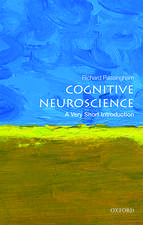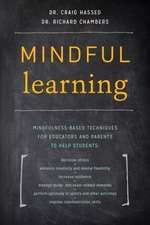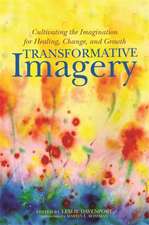Theoretical Issues in Psychology: Proceedings of the International Society for Theoretical Psychology 1999 Conference
Editat de John R. Morss, Niamh Stephenson, Hans van Rapparden Limba Engleză Hardback – 30 mai 2001
| Toate formatele și edițiile | Preț | Express |
|---|---|---|
| Paperback (1) | 955.70 lei 6-8 săpt. | |
| Springer Us – 2 dec 2010 | 955.70 lei 6-8 săpt. | |
| Hardback (1) | 962.18 lei 6-8 săpt. | |
| Springer Us – 30 mai 2001 | 962.18 lei 6-8 săpt. |
Preț: 962.18 lei
Preț vechi: 1173.39 lei
-18% Nou
Puncte Express: 1443
Preț estimativ în valută:
184.12€ • 192.72$ • 153.24£
184.12€ • 192.72$ • 153.24£
Carte tipărită la comandă
Livrare economică 31 martie-14 aprilie
Preluare comenzi: 021 569.72.76
Specificații
ISBN-13: 9780792373377
ISBN-10: 0792373375
Pagini: 414
Ilustrații: XIV, 414 p.
Dimensiuni: 178 x 254 x 32 mm
Greutate: 0.93 kg
Ediția:2001
Editura: Springer Us
Colecția Springer
Locul publicării:New York, NY, United States
ISBN-10: 0792373375
Pagini: 414
Ilustrații: XIV, 414 p.
Dimensiuni: 178 x 254 x 32 mm
Greutate: 0.93 kg
Ediția:2001
Editura: Springer Us
Colecția Springer
Locul publicării:New York, NY, United States
Public țintă
ResearchDescriere
Theoretical Issues in Psychology is published as the discipline of psychology enters its (at least) third century. The year 2001 brings with it millennial reflections, as well as the strange sense of deja vu that we derive from the Kubrick movie. As to the former, a glance at the contents list of this volume will demonstrate both the maturity and the vigour of theoretical debate within psychology. There is a level of sophistication here that should be the cause of quiet celebration. Recent ideas about discursive practice and subjectivity, chaos theory and autopoiesis, are effortlessly entrained with classical issues. Canonical texts are looked at with fresh eyes. Unresolved social and political questions are doggedly persisted with, and new perspectives on the human experience are pioneered. We are not afraid of long words, even if French in origin, but nor are we afraid to recognise that we are physical beings who touch other beings, who hold, desire, and remember - and who talk, talk, talk. For surely it is theoretically-sensitive work in psychology - whether "critical" or not - that best represents what the discipline has to offer the wider community.
Cuprins
Contributors. Preface. I: Embodied Experience. Creative Ways of Being; A. Game. And the Subject Was Made Flesh: The aesthetic and corporate dimensions of psychology's body; H.J. Stam. Plugged In: Psychology, technology and popular culture; B.M. Bayer. Technologies of Trans-Sexing: Discursive tension and resistance within psycho-medical and transgendered theorising of transsexual bodies; K. Roen. II: Social and Cultural Processes. Human Experience and the Enigma of Culture: Toward an enactive account of cultural practice; C. Baerveldt, et al. From Shared Representations to Consensually Coordinated Actions: Toward an intrinsically social psychology; T. Verheggen, C. Baerveldt. Cultural Psychology meets Evolutionary Psychology: Toward a new role for biology in the study of culture and experience; P. Voestermans, C. Baerveldt. The Tajfel Effect; S.D. Brown, P. Lunt. Discourse Analysis and Structural Supervision; A. Hofmeister. Forming Cultures Through Virtual Social Communities; C. Orthmann, L. Näcke. III: Perception, Cognition and Reasoning. Points of View and The Visual Arts: James Turrell, Antonio Damasio and the no-point-of-view phenomenon; C. Benson. Beyond Representationalism: A dynamical approach transcending symbolism in cognitive psychology; D.L. Rowe. The Dialectic of Critique, Theory and Method in Developing Feminist Research on Inference; R.J. Falmagne. Getting Rid of the Homunculus: A direct realist approach; T. McMullen. IV: Social Constructionism and Metatheoretical Issues. Logical Positivism and Gergen's Social Constructionism: No radical disjunction in twentieth century psychological metatheory; F.J. Hibberd. Wittgenstein and Social Constructionism: Methods of`social poetics' or `knots in our thinking'? G.B. Sullivan. Epistemological Framings of Mysticism: Implications for contemporary western psychology; L.S. Jones. Idealization in Science: A methodological reflection; C. Peet. Stratification in Explanation; H. van Rappard. The Withering of Theory in Mainstream Social Psychology Journals: Whither our next theoretical turn? I. Lubek, et al. V: Subjectivity and Development. Being clichéd: Women's talk and feminine subjectivities; N. Stephenson. Individual Responsibility and Society: A subject science approach; U. Osterkamp. Models of the Life-Span for an Ageing Society; R. Leonard, A. Burns. Psychological Theorising in Transdisciplinary Perspective; W. Maiers. Reintegrating Sense into Subjectification; M. Hildebrand-Nilshon, et al. From Law to Lifestyle: `Developmental' change in the Risk Society; J.R. Morss. Subjectivity and Subjectioning: Between determination and self-government; L. Näcke, E. Park. VI: Therapy and the Unconscious. Finding a Place to Stand: Reflections on discourse and intertextuality in counselling practice; D. Paré. The Influence of Psychotherapeutic Practices on a Hermeneutics of Discourse; A. Baydala. A Problem Aired: Radio therapeutic discourse and modes of subjection; I. Hodges. Psychology in the Twenty-First Century: Closing the gap between science and the symbol; A. Petocz. The Dynamic Unconscious Revisited: The role of motivation, affect, embodiment and intersubjectivity in catching ourselves unawares; D. McIlwain. Symbolism of the Tower as Abjection; I. Semetsky. Index.














